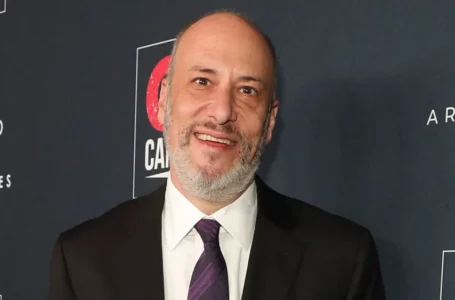Despite a lineup of in-demand performers including Ariana Grande, Rosalía, Lizzo and pop-goth wunderkind Billie Eilish, the coming Grammy Awards will, for the third time in as many years, take place amid turmoil within its ranks.
Last week, the Recording Academy, which puts on the annual ceremony, announced that its chief executive, Deborah Dugan, had been placed on administrative leave after a “formal allegation of misconduct by a senior female member” of the organization. Dugan’s suspension arrived less than six months into her tenure as the academy’s first female chief executive and president — and just days ahead of the Jan. 26 ceremony.
Dugan responded Tuesday in a stunning 44-page complaint filed with the Equal Employment Opportunity Commission, alleging gender discrimination, sexual harassment and unequal pay on the part of the academy. The complaint, officially known as a charge of discrimination, also claims the organization retaliated against Dugan after she raised concerns — in an email to a senior human resources executive — that the academy was operating under a “’boys’ club’ mentality.”
In her email, Dugan accused Joel Katz, an entertainment lawyer who serves as the academy’s general counsel, of sexually harassing her. The filing also said that allegations of rape by a female artist were “the real reason” the contract of Dugan’s predecessor, Neil Portnow, was not renewed. Portnow, in a statement to media outlets Wednesday, denied the allegations “unequivocally” and called them “ludicrous, and untrue.”
Dugan’s lawsuit signals a reckoning for the embattled 63-year-old organization, which has faced mounting criticism in recent years over the Grammys’ failure to properly recognize female artists and artists of color. Here are some answers to questions you might have about the lawsuit — and how it might affect the Grammys in the future.
When did the controversy start?
According to Dugan’s lawsuit, she emailed the academy’s director of human resources on Dec. 22, detailing “serious concerns” she had since taking over the organization in August. The email makes a number of claims, ranging from alleged conflicts of interest among the members of the academy’s board of trustees to irregularities in the Grammy voting process.
Dugan also alleged she had been personally sexually harassed by Katz, a former member and chair of the academy’s board of trustees, at a business dinner before her hiring as chief executive. According to Dugan, Katz commented repeatedly on her appearance and attempted to kiss her during the meeting. In her email, Dugan noted that “Mr. Katz’s comments about my looks and suggestive remarks have continued unabated since our first meeting.” (As reported by Deadline, Katz responded through his attorney, who said Katz “categorically and emphatically denies her version of that evening.”)
How did the academy respond?
Dugan’s complaint includes an email response from the HR executive, who notes “these are serious issues that need to be investigated.” Dugan was put on administrative leave just three weeks later — a decision her legal team says “was clearly made in retaliation” for raising concerns.
The complaint also takes issue with the statement the academy released recently. Dugan claims board chair Harvey Mason Jr., currently serving as the academy’s interim chief executive, assured her the organization would not offer any statements about the leave, aside from saying, if asked, that Dugan had taken a leave of absence. Instead, the complaint claims, “the board leaked to the press that Ms. Dugan had been ‘placed’ on administrative leave.”
Dugan further disputes the academy’s framing of the unspecified allegations of misconduct. Her complaint cast the issue as a dispute involving Portnow’s former executive assistant, and Dugan’s efforts to find the employee a new role after it “became clear that” the employee “was not up to the task” of assisting Dugan. The New York Times, citing “a person with direct knowledge of the events,” said the assistant had accused Dugan of a “bullying management style” that led the assistant to take a leave of absence.
After the academy’s statement last week, a lawyer for Dugan put out a statement alluding to the Grammys’ tumultuous history.
What has been reported is not nearly the story that needs to be told. When our ability to speak is not restrained by a 28-page contract and legal threats, we will expose what happens when you ‘step up’ at the Recording Academy, a public nonprofit.
Bryan J. Freedman told the paper.
What’s with all the ‘step up’ references?
The Grammys have been in relative chaos since 2018 when then-president Portnow was asked about the lack of female winners at that year’s ceremony. Portnow told Variety that “women who have the creativity in their hearts and souls, who want to be musicians, who want to be engineers, producers, and want to be part of the industry on the executive level” needed to “step up.”
That didn’t go over well. For one, the nominees for the 2018 ceremony included chart-topping female artists such as Lorde, Lady Gaga and SZA. And Beyoncé fans in and around the Beyhive were still smarting after the singer’s transcendent “Lemonade” lost (to Adele’s “25”) in the 2017 album of the year category. Portnow’s comments, which he later said were taken out of context, drew condemnation from music fans and artists alike.
“Women OWNED music this year,” Pink wrote in a letter shared to her Twitter account. “And every year before this. When we celebrate and honor the talent and accomplishments of women, and how much women STEP UP every year, against all odds, we show the next generation … what it means to be equal, and what it looks like to be fair.”
Longtime Grammys Executive Producer Ken Ehrlich didn’t exactly help matters when he addressed the seemingly disproportionate stage time the ceremony’s female nominees received at the 2018 ceremony. As Variety reported, Lorde, the lone woman up for album of the year, declined to perform after producers asked her to be part of a multi-artist tribute to Tom Petty — despite the fact the male artists in the category had all been offered solo performance slots.
“These shows are always a matter of choices,” Ehrlich said, noting that Lorde “had a great album, but there’s no way we can deal with everybody.”
Why does the name Ken Ehrlich sound familiar?
Ehrlich was at the center of last year’s Grammys drama, which unfolded after Grande tweeted she had pulled out of a planned performance because of a creative disagreement with the ceremony’s producers.
Ehrlich cast Grande’s decision in a different light, telling the Associated Press that by the time the singer and the producers agreed a performance might be possible, Grande “felt it was too late for her to pull something together for sure.”
Grande refuted that on Twitter, directly addressing Ehrlich: “i can pull together a performance over night and you know that, Ken,” she wrote. “It was when my creativity & self expression was stifled by you, that i decided not to attend.”
Ehrlich, whose approach to the Grammys had previously been criticized by Frank Ocean, Drake and Kanye West, later announced he would be stepping down from his role. This year’s ceremony will mark his last as executive producer.
Does Dugan’s complaint address the academy’s fraught history with the hip-hop community?
Yes, in addition to highlighting the Grammys’ historic underrepresentation of women, Dugan’s complaint argues that the ceremony’s lack of diversity has repeatedly shut rap and R&B stars such as West, Kendrick Lamar and Beyoncé out of the running for album of the year and other major categories.
Critics have long lamented the ceremony’s oversights when it comes to groundbreaking rap artists, but Dugan’s complaint adds disturbing context to the Grammy voting process, outlining a system shrouded “in secrecy” and hampered by a lack of diversity among the academy’s 12,000 voting members. The complaint also asserts that nominations are further skewed by board members who “push forward artists with whom they have relationships.”
What happens now?
There’s no indication the dispute between Dugan and the academy will have an impact on the Jan. 26 ceremony. (The academy’s Twitter account continues to tease out the artists performing on “Music’s Biggest Night.”) But there is little doubt Dugan’s allegations will have implications for the academy’s future, as well as ongoing conversations about gender discrimination and sexual misconduct in the entertainment world.
“The complaint that we filed today against the National Academy of Recording Arts and Sciences (the Grammys) highlights tactics reminiscent of those deployed by individuals defending Harvey Weinstein,” Dugan’s attorneys said in a statement Tuesday, referring to the disgraced Hollywood producer who is on trial for alleged sexual assault. “As we allege, the attempt by the Recording Academy to impugn the character of Deborah Dugan is a transparent effort to shift the focus away from its own unlawful activity. This blatant form of retaliation in corporate America is all too common, even post #MeToo, and we will utilize all lawful means necessary to ensure that those responsible are held accountable for their actions.”
Dugan’s complaint could lead to mediation or an investigation by the EEOC, according to the agency’s website. Should the EEOC decline to investigate or if an investigation finds no discrimination, Dugan could file a lawsuit against the academy.
For the academy’s part, Mason assured members — in an internal memo obtained last week by Rolling Stone — that operations would “proceed as normal during the interim leadership period” and that the academy’s board “is committed to fostering a safe, diverse and inclusive workplace, music industry and society.”
Mason later addressed Grammy viewers in a letter posted to the event’s website. “As Grammy week is upon us,” he wrote, “I truly hope we can focus our attention on the artists who’ve received nominations and deserve to be celebrated at this time of the year, and not give credence to unsubstantiated attacks on the Academy.”
Dugan said in an appearance Thursday on “Good Morning America” that she will be watching the ceremony in spite of the drama. Asked by host George Stephanopoulos if viewers should be skeptical about what plays out on Sunday, Dugan said she simply wants the voting system to be transparent “and that there are incidents of conflict of interest that taints the results.”
“I hate that I’m in this situation because I’d much rather be here talking about the artists and the music,” she added.





